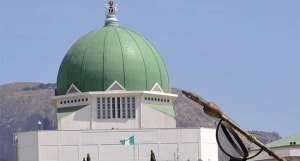 For the third day running, federal lawmakers in the Senate and House of Representatives continued the debate on the 2016 Budget.
For the third day running, federal lawmakers in the Senate and House of Representatives continued the debate on the 2016 Budget.
Unlike previous days, lawmakers set aside party sentiments to dissect and debate the 2016 budget.
There were criticisms and mixed reactions as lawmakers expressed their views on the budget.
Some Senators slammed the budget for not adequately taking into account, development projects in the Ministry of Women Affairs meant to ameliorate the sufferings of women in the country.
Some other Senators who agreed that there was the need to limit the expenditure of monies borrowed to fund capital projects, also stressed the need to diversify the economy, following the dwindling price of oil in the international market.
The lawmakers said that the funds appropriated to the ministries of Agriculture and Solid Minerals does not show government’s seriousness in trying to diversify the economy.
The budget debate was expected to end on Tuesday but was shifted to Wednesday, January 26.
The debate started on Wednesday, January 20 at both the upper and lower chambers of the National Assembly in Abuja, with the lawmakers in the Senate sharing divided opinions on the financial plan.
Some opposition lawmakers in the Peoples Democratic Party (PDP) had questioned the financial capacity of the government to fund the budget, considering the fall in oil prices and the deficit in the budget with an initial oil price benchmark of $38 per barrel.
However, some legislators from the ruling All Progressives Congress hailed the budget while describing it as a ‘budget of the people’.
Controversies
Controversies over the budget started after rumours spread that the budget had disappeared.
Few days after that rumour, the Senate President, Bukola Saraki, revealed that the Senior Special Assistant to the President on the Senate, Senator Ita Enag, reproduced a budget document different from what President Buhari originally submitted to the National Assembly.
He said that the Senate would only treat the document presented to the Senate by the President.
To end the controversy, the President wrote to the National Assembly making some alterations.
The President asked the lawmakers to work with the corrected version of the financial plan as his 2016 budget estimates.
Subsequently, the Senate accepted and adopted the alterations in the 2016 Appropriation Bill.
The total budgetary allocation for 2016 is 6.8 trillion Naira, an increase of one trillion Naira from the revised allocation of 5.9 trillion Naira for 2015.
In the breakdown, 2.648 trillion Naira was for recurrent expenditure while 1.85 trillion Naira was for capital expenditure and 1.475 trillion Naira for debt service.

No comments:
Post a Comment